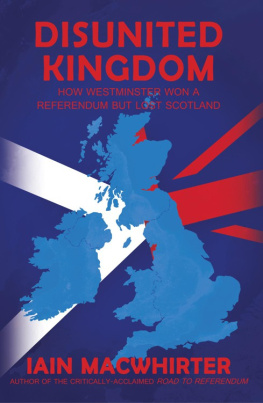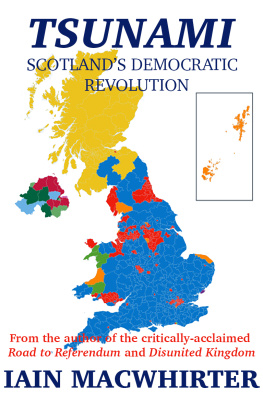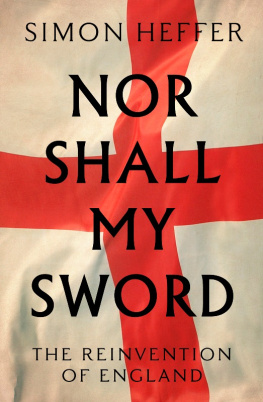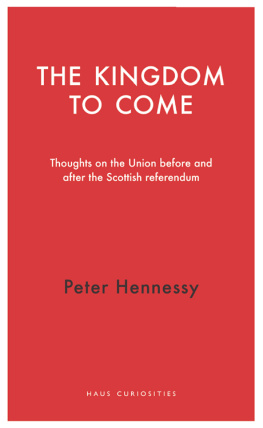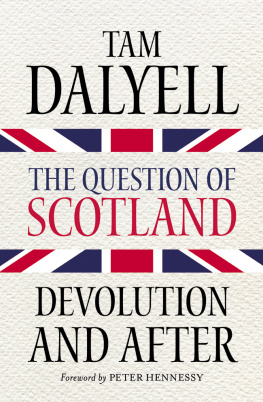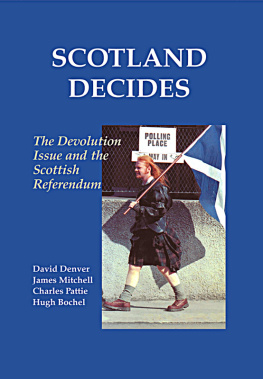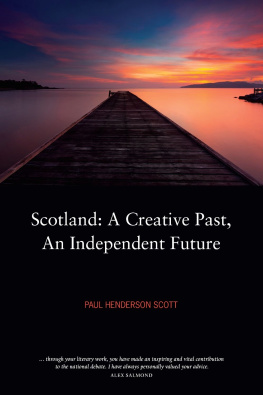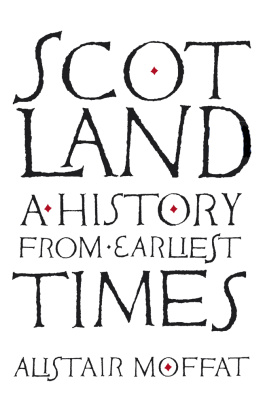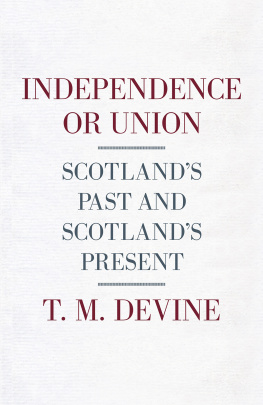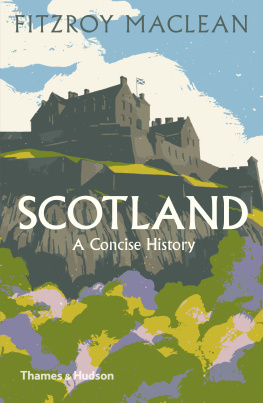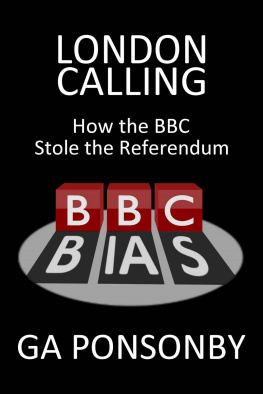PRAISE FOR ROAD TO REFERENDUM
A truly important book, particularly at this moment. It offers a huge sweep of history and deals with recent Scottish politics in formidable, but never tedious detail.
Andrew Marr, BBC
A terrific book. Macwhirter covers much more than he does in his TV documentary, and the book combines a broad history of Scotlands relationship with England from the time of Robert the Bruce onwards with a detailed analysis of the rise of the SNP, the creation of the Scottish parliament and the run-up to the referendum. Its a heavyweight, serious book, but its a pleasure to read and its full of shrewd insights. Id recommend it highly.
Andrew Sparrow, The Guardian
Iain Macwhirter is shrewd, insightful and with few rivals in the business of understanding and explaining the changing politics of Scotland.
Jonathan Freedland, The Guardian
Iain Macwhirter offers a highly readable and personal account of Scottish history drawing on wide reading and a career during which he has followed these debates more closely and consistently than any other journalist. He enlivens old stories with new perspectives, challenges established wisdom and raises awkward questions for protagonists and antagonists in equal measure on either side of todays debate.
Professor James Mitchell, University of Edinburgh
Peppered with typical Macwhirter one-liners... They could provide student essay questions for years to come with only the word discuss added to them.
Professor Tom Devine, The Herald
To Tiffany, who said Yes even though she said No.
PREFACE
I started writing this book to record my experiences covering the most extraordinary political campaign I have seen in over a quarter of a century writing about politics. And partly to reassure myself that it really happened. What follows is a personal account: history as I saw it. But I believe it is also an accurate one, based on direct contact with most of the key people involved.
The 2014 independence referendum was a boisterous festival of political participation that brought the highest electoral turnout since the establishment of universal adult suffrage. Nearly half the adult population of Scotland voted for independence in a country that really had no significant independent movement until a decade or so ago.
Of course, the result of the referendum was No, which has left many people in Scotland very disappointed. But I dont believe there is any need to be. The result was fascinating in its ambiguity. The Unionists didnt quite win, and the Yes campaign didnt quite lose.
Everyone accepts that change has to come. The tensions that have emerged between the social democratic aspirations of Scotland and the political realities of Westminster politics are simply too great to be contained within what I will argue is still, essentially, a unitary UK state.
But the people of these islands have been here before and have found imaginative ways of coexisting. The 1707 Union itself was one such, and it worked for over three hundred years. But the paradox of the glorious referendum, as some have called it, is that the old Union became redundant almost soon as Scots had voted for it.
This book isnt a propaganda work, a manifesto, or an attempt to rewrite history. I hope unionists will read it with open minds because some may be surprised at what they find in here. I examine the failings of both sides in the campaign and stress that the real victors were the Scottish people themselves.
As the great Scottish historian Professor Tom Devine said on September 20th 2014 at the Bloody Scotland Conference in Stirling: the United Kingdom state is dead; long live the UK.
CHAPTER ONE
The Glorious Referendum Scotlands Festival of Politics
A thin grey dawn was breaking over Edinburghs Salisbury Crags as I arrived at Dynamic Earth, the evolution exhibition in Holyrood, a kind of mini-Millennium dome, for the Yes Scotland campaigns victory party. It was 6am on the morning of Friday 19th September and there was precious little celebration amid the plastic dinosaurs and luminous planets. The Yes campaign had hoped this venue would symbolise Scotland evolving to the next level. But it didnt happen. For the first time in 300 years, the Scottish people had a democratic vote on whether or not to stay in the United Kingdom, and they voted to remain by a margin of 55% to 45%. It seemed the Great British Brontosaurus wasnt heading for extinction after all.
As nationalist politicians, media figures, and Yes Scotland luminaries milled around waiting for Alex Salmond to deliver the speech they all knew hed prepared, but hoped he wouldnt have to deliver, there was an air of resignation rather than despair. Many were too exhausted to talk. Of course there were tears this had been the most emotionally demanding campaign many had seen. The chief executive of the Yes Scotland campaign, Blair Jenkins, wrestled with his emotions as he endured a succession of media interviews asking him how he felt about the result. How did they bloody well expect him to feel? Hed spent every waking hour, and most of the non-waking ones too, for 30 months on this campaign the longest in Scottish political history. He gathered together some platitudes about the great campaign and civic engagement.
The Yes campaign had not been without internal rivalries and policy divisions. Jenkins, a former BBC head of News and Current Affairs, had been accused of spending too much of the campaigns cash on its central Glasgow headquarters and high salaries for staff, most of whom didnt go the distance. But as the morning drizzle fogged the panoramic windows of Dynamic Earth, there were few recriminations. No thumb-over-the-shoulder blaming of others at least not yet. This was largely because everyone was agreed, even on the Unionist side, that the Yes campaign had been by far the better one positive, cultural, people-centred and energetic.
Yes Scotland, the umbrella group that brought together thousands of volunteers in 300 local groups, deserved much of the credit for delivering the highest level of voter registration in electoral history: 97%. Mind you, as one guest remarked ruefully, the Yes campaign had been a bit too damn good at generating voter engagement and had inadvertently motivated many Unionist voters to come out and vote No. On the eve of the poll, opinion surveys had forecast a much narrower result: 52% 48% according Professor John Curtices poll of polls which was one reason many believed the Yes campaign had squeaked it. On the morning of polling day, the media attention had focussed on the queues of eager Yes voters outside the polling stations at 7am. This had left a somewhat misleading impression that the momentum was all with the independence campaign. But the No voters had arrived later, without fanfare, heads bowed, avoiding the attention of cameras and canvassers alike.
No one realised at this stage that Alex Salmond was himself about to be the first casualty of the 2014 referendum night. But there were already suggestions in his short speech accepting the verdict of the people that he was part of history. I tweeted a picture of him with the text: 06.20am Alex Salmonds last stand, sensing that he might not be around for long. He certainly looked the worse for wear. The First Minister isnt one to dwell on his defeats however, and he claimed that the result had been a triumph for democracy and then congratulated himself for having held the referendum in the first place. And while this was perhaps not the time to say so even before the formal result of the referendum had been declared he was right.
The Yes campaign had achieved a very impressive result, even a sensational one. Only six weeks previously, few commentators would have believed it if theyd been told that 45% of Scottish voters were going to vote for independence after an extraordinary campaign in which saw 85% turnout the highest in any British election since the introduction of universal suffrage. Many unionists had confidently forecast a result of 70/30 in favour of the Union and with cause. For most of the previous thirty years, one of the abiding constants of Scottish politics has been that only around 30% of Scots consistently tell opinion polls that they want formal independence for Scotland. The vast majority, over 60%, have always said that they wish to see a Scottish parliament with enhanced economic powers what is usually called devolution max. So to have persuaded 1.6 million Scots to vote for independence was certainly nothing to be ashamed of. The Yes campaign shook the UK political and financial establishment to its very foundations. It could so easily have been Prime Minister, David Cameron, who was announcing his resignation that morning. He had managed to squander a 22 point opinion poll lead in little over a month. The Union was only saved by a last minute appeal from a humiliated Prime Minister accompanied by the promise from a former Prime Minister, Gordon Brown, of something approximating to federalism.
Next page
